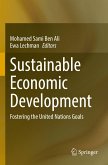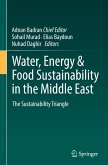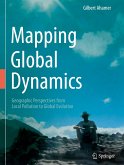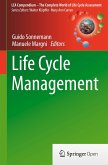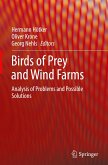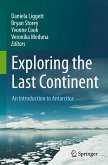Towards Sustainable Urban Regeneration: Utilizing Environmental, Cultural, and Social Assets
Herausgegeben:Alberti, Francesco; Gallo, Paola; Altan, Hasim; Labalestra, Antonio; Strauss, Eric J.
Versandkostenfrei innerhalb Deutschlands
209,99 €
inkl. MwSt.
Versandkostenfrei*
Erscheint vorauss. 28. Februar 2026
Melden Sie sich
hier
hier
für den Produktalarm an, um über die Verfügbarkeit des Produkts informiert zu werden.

105 °P sammeln
Towards Sustainable Urban Regeneration: Utilizing Environmental, Cultural, and Social Assets
Herausgegeben:Alberti, Francesco; Gallo, Paola; Altan, Hasim; Labalestra, Antonio; Strauss, Eric J.
- Gebundenes Buch
This book explores innovative approaches to sustainable urban development, focusing on energy efficiency, climate adaptation, green infrastructure, and smart city technologies. Addressing pressing environmental challenges, this book presents the most recent research on energy-efficient building design, urban resilience, and sustainable mobility solutions. The first section examines the role of energy efficiency in mitigating climate change, analyzing case studies on retrofitting buildings, passive architecture, and the impact of material choices. The second section explores urban climate…mehr
Andere Kunden interessierten sich auch für
![Sustainable Economic Development Sustainable Economic Development]() Sustainable Economic Development115,99 €
Sustainable Economic Development115,99 €![Water, Energy & Food Sustainability in the Middle East Water, Energy & Food Sustainability in the Middle East]() Water, Energy & Food Sustainability in the Middle East91,99 €
Water, Energy & Food Sustainability in the Middle East91,99 €![Mapping Global Dynamics Mapping Global Dynamics]() Gilbert AhamerMapping Global Dynamics175,99 €
Gilbert AhamerMapping Global Dynamics175,99 €![Life Cycle Management Life Cycle Management]() Life Cycle Management38,99 €
Life Cycle Management38,99 €![Birds of Prey and Wind Farms Birds of Prey and Wind Farms]() Birds of Prey and Wind Farms113,99 €
Birds of Prey and Wind Farms113,99 €![Facing Up to Global Warming Facing Up to Global Warming]() N.F. GrayFacing Up to Global Warming38,99 €
N.F. GrayFacing Up to Global Warming38,99 €![Exploring the Last Continent Exploring the Last Continent]() Exploring the Last Continent175,99 €
Exploring the Last Continent175,99 €-
-
-
This book explores innovative approaches to sustainable urban development, focusing on energy efficiency, climate adaptation, green infrastructure, and smart city technologies. Addressing pressing environmental challenges, this book presents the most recent research on energy-efficient building design, urban resilience, and sustainable mobility solutions. The first section examines the role of energy efficiency in mitigating climate change, analyzing case studies on retrofitting buildings, passive architecture, and the impact of material choices. The second section explores urban climate resilience, highlighting the benefits of green infrastructure, street trees, and water-sensitive urban design. The third section shifts towards sustainable urban planning, emphasizing mobility transformation, cultural heritage preservation, and equitable urban design. The final section investigates digital tools and technological innovations, including smart cities, robotics, and circular economy practices in urban construction. By bringing together a diverse range of perspectives from architecture, engineering, and urban planning, this book provides actionable insights for policymakers, researchers, and practitioners committed to creating sustainable cities.
Produktdetails
- Produktdetails
- Advances in Science, Technology & Innovation
- Verlag: Springer / Springer Nature Switzerland / Springer, Berlin
- Artikelnr. des Verlages: 89565253, 978-3-032-02090-1
- Seitenzahl: 350
- Erscheinungstermin: 28. Februar 2026
- Englisch
- Abmessung: 279mm x 210mm
- ISBN-13: 9783032020901
- ISBN-10: 3032020905
- Artikelnr.: 74878785
- Herstellerkennzeichnung
- Springer-Verlag GmbH
- Tiergartenstr. 17
- 69121 Heidelberg
- ProductSafety@springernature.com
- Advances in Science, Technology & Innovation
- Verlag: Springer / Springer Nature Switzerland / Springer, Berlin
- Artikelnr. des Verlages: 89565253, 978-3-032-02090-1
- Seitenzahl: 350
- Erscheinungstermin: 28. Februar 2026
- Englisch
- Abmessung: 279mm x 210mm
- ISBN-13: 9783032020901
- ISBN-10: 3032020905
- Artikelnr.: 74878785
- Herstellerkennzeichnung
- Springer-Verlag GmbH
- Tiergartenstr. 17
- 69121 Heidelberg
- ProductSafety@springernature.com
Francesco Alberti is an Associate Professor of Urban Planning and Design at the Department of Architecture, University of Florence. He currently coordinates the Urban Design Laboratories for the five-year single-cycle Master’s Degree in Architecture, as well as the Urban and Infrastructure Design Laboratories for the Master’s Degree in Urban and Regional Planning and Design for Sustainability. He also teaches Smart City Planning in the postgraduate program “ABITA” (Bioecological Architecture and Technological Innovation for the Environment). Within the same department, he serves as the scientific coordinator of the research unit “SUP&R” (Sustainable Urban Projects & Research) and of the related university spin-off “Urban LIFE” (Urban Liveability & Innovation for Everyone). He is also a member of the University of Florence’s scientific team at the “Urban Mobility” spoke of the “National Centre on Sustainable Mobility,” established in 2022 by the Italian Government. Paola Gallo is a full professor in Architectural Technology at the University of Florence, Department of Architecture DIDA, where she carries out teaching and research activities. Scientific Secretary since 2007 of the Interuniversity Research Centre in Bio-ecological Architecture and Technological Innovation for the Environment is Coordinator of the ABITA Master at the University of Florence. Scientific Director since 2017 of the TAM Laboratory of Technologies for the Mediterranean Area of the DIDALAB System of the DIDA (Department of Architecture) of the University of Florence. Coordinator of the Ph.D. Program: Sustainability and Innovation for the Built Environment and Product System Design at the DIDA Department of Architecture, University of Florence. Hasim Altan (B.Arch., M.Arch., Ph.D., PGCE, FHEA) is a full professor of Sustainable Design and Architectural Engineering in the College of Engineering at the United Arab Emirates University (UAEU) in Al Ain, Abu Dhabi, UAE. He began his academic career as a lecturer after successfully completing his Ph.D. degree in 2004, during which he was also appointed as a Postdoctoral Research Fellow in the School of Architecture at the University of Sheffield (UK). While there, he completed his Postgraduate Certificate in Teaching and Learning in Higher Education and subsequently became a Fellow of the Higher Education Academy (HEA). He is a Chartered Architect (RIBA) and a Chartered Engineer (CIBSE) with over 20 years of academic and practical experience in the field of Architecture, Engineering, and Construction (AEC) within the Built Environment across the UK, Europe, the Middle East, and North Africa (MENA) regions. Antonio Labalestra is an associate professor with a Ph.D. in the History of Architecture from IUAV in Venice and a second-level European master’s degree from the University of Roma Tre. He has organized and curated numerous academic and cultural events, including seminars, lecture series, film festivals, and exhibitions. Labalestra is a member of two doctoral colleges at the Polytechnic University of Bari and teaches contemporary architectural history and design history. His research focuses on architectural history from the late 19th to 20th centuries, particularly its intersections with applied arts and industrial production. An active scholar, he contributes extensively to books, journals, and scientific editorial boards. His notable work includes *Il palazzo del Governo di Taranto*. Since 2020, he has led the “Historical Heritage and Archival Sources” laboratory and directs a master’s program on digital strategies for historical heritage. Eric J. Strauss (J.D. in Law and Ph.D. in Urban and Regional Planning) has held faculty positions in the following disciplines: agriculture; architecture and urban design; environmental studies; geography; law; public administration; public affairs; and urban and regional planning. After serving on a Governor’s staff in Wisconsin, he joined the University of Kansas. His research areas included such topics as energy conservation, growth management, adequate public facilities and climate change planning. He later moved to Michigan State University to direct the Urban and Regional Planning Program and is now Professor Emeritus.. He has taught at Universities in Ireland, Germany, Romania, South Korea, and Turkey. He has been a Fulbright Scholar in Panama and Romania.
Assessment of Green Infrastructure in the Context of Urban Sustainability: A Study in Northern Nicosia.- The 'Mugnone River Contract': A Green and Blue Infrastructure for the Florence Metropolitan Area.- Pocket Parks in Florence: A Strategic Integration for Urban Green Infrastructure.- Ruralizing the Urban Envelope: Experimental Tools to Cultivate the City.- Impact of Street Trees on Thermal Comfort and Air Quality.- From Margin to Urban Interface: Designing a Network of Open Spaces as a New Public Park Around the Heritage City Walls of Siena.- Planning the Development of Urban Parks as Green Public Spaces in Colonial Java.- New Design Approaches for Urban Voids: Developing a Framework for Analyzing Innovative Projects in Terrain Vague Spaces.- Evaluating the Ecosystemic Function of the "Model Cities" to Lead Contemporary Urban Sustainability.- Ecosystem Services to the Test of the Territory: Perspectives for the Urban Bioregion Approach.- Enhancing Urban Connectivity: A Comprehensive Study of Transit-Oriented Development.- Beyond Transit-Oriented Development - Linear or Transit Cities.- Transformation of Highways to Reduce GHG Emissions and Improve Social Equity, Syracuse & Brooklyn, NY.- Research on Sustainable Urban Design Based on Small-Scale and Progressive Concepts.- Revitalization Strategies for Inner Areas in Italy: Constraints and Opportunities from an Analysis of Best Practices.- Urban Design Principles for Sustainable and Well-Being Compounds in the Sultanate of Oman.- Housing Transformation and Spatial Organization: The Case of Sha'abiat Model in Al-Ain, UAE.- Ho Chi Minh City's Central Area From the Perspective of Sustainable Urban Design.- The Built Environment Policy Making: The Egyptian New Administrative Capital Model.- Revival of Urban Heritage as an Engine of Social and Economic Recovery in Post-War Homs, Syria.- Identity in the Physical Environment: Concept and Methods for Its Evaluation and Preservation Through Participatory Design.- The Medieval Aqueduct of Perugia: From Abandonment to Reuse as a Pedestrian Path.- From Cultural Preservation to Cultural Tourism: Examining the Heritagization of Rijal Almaa's Vernacular Architecture Within the Al Soudah Peaks Development.- Innovative Concept for Preserving the Darmo Surabaya Conservation Area Based on a City Morphological Perspective.- Knowledge and Valorization of Sepulchral Cavities in the Neapolitan Underground.- Participatory Heritage: Reflection About the Elaboration of the Atlas of Territorial Heritage of Playa, La Havana, Cuba.- Cosmopolitan Paradox: Dynamic Egalitarianism in the Redevelopment of the Cultural Center of the Philippines Complex.- The Paradoxical Heterogeneity of Al-Abdali's Imageability and the Dilemmatic Identity of Amman.- Spatial Identities of Sarajevo's Residential Neighborhoods.- Exploring Urban Elements in a Post-Industrial Destination: A Case Study of Bilbao.- Bridging Affordability and Resilience in African Housing: A Case Study of Housing Design Guidelines in Kenya.- Investigating Universal Design Within the Framework of Social Sustainability in Northern Nicosia with Analyses and User Views.- Community Engagement as an Innovative Urban Design Strategy: Conservation and Revitalization of Pantang Historic District, Guangzhou.- Alternative Planning: The Mondeggi Experience.- Shared Living with Local Connections: Creating a New Neighborhood Through the Participation of Young People.- Normalizing Neglected Public Spaces: The Case of Portoviejo's Ground Transportation Node.- Enhancing Quality of Life for Older Adults in Rural Thailand: The Role of Community Residential Environments in Ageing-in-Place Strategies.
Assessment of Green Infrastructure in the Context of Urban Sustainability: A Study in Northern Nicosia.- The 'Mugnone River Contract': A Green and Blue Infrastructure for the Florence Metropolitan Area.- Pocket Parks in Florence: A Strategic Integration for Urban Green Infrastructure.- Ruralizing the Urban Envelope: Experimental Tools to Cultivate the City.- Impact of Street Trees on Thermal Comfort and Air Quality.- From Margin to Urban Interface: Designing a Network of Open Spaces as a New Public Park Around the Heritage City Walls of Siena.- Planning the Development of Urban Parks as Green Public Spaces in Colonial Java.- New Design Approaches for Urban Voids: Developing a Framework for Analyzing Innovative Projects in Terrain Vague Spaces.- Evaluating the Ecosystemic Function of the "Model Cities" to Lead Contemporary Urban Sustainability.- Ecosystem Services to the Test of the Territory: Perspectives for the Urban Bioregion Approach.- Enhancing Urban Connectivity: A Comprehensive Study of Transit-Oriented Development.- Beyond Transit-Oriented Development - Linear or Transit Cities.- Transformation of Highways to Reduce GHG Emissions and Improve Social Equity, Syracuse & Brooklyn, NY.- Research on Sustainable Urban Design Based on Small-Scale and Progressive Concepts.- Revitalization Strategies for Inner Areas in Italy: Constraints and Opportunities from an Analysis of Best Practices.- Urban Design Principles for Sustainable and Well-Being Compounds in the Sultanate of Oman.- Housing Transformation and Spatial Organization: The Case of Sha'abiat Model in Al-Ain, UAE.- Ho Chi Minh City's Central Area From the Perspective of Sustainable Urban Design.- The Built Environment Policy Making: The Egyptian New Administrative Capital Model.- Revival of Urban Heritage as an Engine of Social and Economic Recovery in Post-War Homs, Syria.- Identity in the Physical Environment: Concept and Methods for Its Evaluation and Preservation Through Participatory Design.- The Medieval Aqueduct of Perugia: From Abandonment to Reuse as a Pedestrian Path.- From Cultural Preservation to Cultural Tourism: Examining the Heritagization of Rijal Almaa's Vernacular Architecture Within the Al Soudah Peaks Development.- Innovative Concept for Preserving the Darmo Surabaya Conservation Area Based on a City Morphological Perspective.- Knowledge and Valorization of Sepulchral Cavities in the Neapolitan Underground.- Participatory Heritage: Reflection About the Elaboration of the Atlas of Territorial Heritage of Playa, La Havana, Cuba.- Cosmopolitan Paradox: Dynamic Egalitarianism in the Redevelopment of the Cultural Center of the Philippines Complex.- The Paradoxical Heterogeneity of Al-Abdali's Imageability and the Dilemmatic Identity of Amman.- Spatial Identities of Sarajevo's Residential Neighborhoods.- Exploring Urban Elements in a Post-Industrial Destination: A Case Study of Bilbao.- Bridging Affordability and Resilience in African Housing: A Case Study of Housing Design Guidelines in Kenya.- Investigating Universal Design Within the Framework of Social Sustainability in Northern Nicosia with Analyses and User Views.- Community Engagement as an Innovative Urban Design Strategy: Conservation and Revitalization of Pantang Historic District, Guangzhou.- Alternative Planning: The Mondeggi Experience.- Shared Living with Local Connections: Creating a New Neighborhood Through the Participation of Young People.- Normalizing Neglected Public Spaces: The Case of Portoviejo's Ground Transportation Node.- Enhancing Quality of Life for Older Adults in Rural Thailand: The Role of Community Residential Environments in Ageing-in-Place Strategies.

